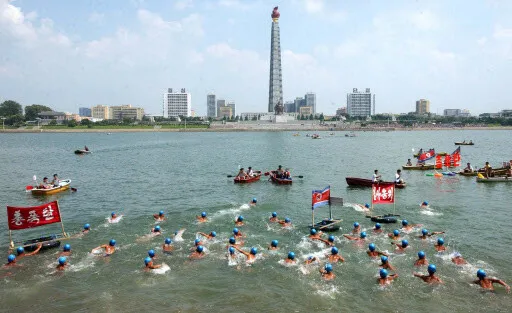hankyoreh
Links to other country sites 다른 나라 사이트 링크
[Analysis] Using inter-Korean cooperation projects as incentives for nuclear issue

Talks between South Korean and North Korean Red Cross chapters are scheduled to take place this Wednesday through Friday at Mt. Kumkang.
Experts on North Korea are calling these talks a “surprise offensive” or attempt by North Korea to realize a shift in the state of inter-Korean relations. The date North Korea accepted for the talks, Aug 26, falls during the Ulchi-Freedom Guardian joint military exercise between South Korea and the U.S., which North Korea has strongly objected to in the past as “practice for an invasion of North Korea.” For this reason, some observers had predicted that North Korea might postpone the talks until after the exercise. However, since North Korea has accepted the date suggested by South Korea, observers are now interpreting this to mean that North Korea is taking an active approach and is not concerning itself with factors that may serve as obstacles to dialogue.
North Korea’s agreement to allow the Red Cross talks to take place is being seen within a recent string of conciliatory moves towards South Korea. On Aug 13, North Korea freed Yu Seong-jin, a Hyundai Asan employee who had been under detention for 137 days at the Kaesong Industrial Complex. On Aug 16, North Korean leader Kim Jong-il met with Hyundai Group Chairwoman Hyun Jung-eun. During this meeting, North Korea and the Hyundai Group agreed upon a five-point plan for inter-Korean exchange and cooperation efforts, including resuming reunions among separated family members. North Korea also sent a mourning delegation of special envoys to Seoul on Aug 21 to convey condolences over the death of former President Kim Dae-jung, which indicated that it was actively sounding out the possibility for resuming inter-Korean exchange and cooperation. These gestures also follow in the same vein as a string of conciliatory measures directed at the U.S., including allowing former U.S. President Bill Clinton to visit Pyongyang earlier this month, pardoning the two U.S. journalists, and inviting U.S. Special Representative for North Korea Policy Stephen W. Bosworth for a visit.
This apparent resolve from North Korea was also demonstrated clearly in Tuesday reports on Radio Pyongyang, the nation’s international broadcasting service. In a program on South Korea-related issues Tuesday, there were no traces of abusive epithets such as “traitor” and “gang of rebels” that it customarily deploys when referring to the Lee administration. Some observers say this indicates that North Korea may be complying with a request by South Korean authorities that it stops slandering President Lee as a precondition for restoring inter-Korean relations.
The Lee government seems encouraged by North Korea’s change in attitude, but at the same time is indicating that it will not submit to being dragged around by North Korea’s demands. “It would be prudent for us to examine North Korea’s sincerity through instances that include the Red Cross talks and then make a decision on government policy regarding major issues in inter-Korean relations like Mt. Kumkang tourism,” said one government official.
Reports are circulating that the government is planning to pursue working-level discussions on issues in inter-Korean relations, including the resumption of tourism to Mt. Kumkang, while observing how talks progress between the South Korean and North Korean Red Cross chapters. A Unification Ministry official is saying, “It would be advantageous for us to first have working-level discussions that resolve major areas in inter-Korean relations that have been cut off, and then proceed with high-level discussions towards improving overall inter-Korean relations.”
However, some observers are suggesting that major areas of economic cooperation should be used as a means of realizing dialogue between South Korean and North Korean authorities with the ultimate goal of resolving the North Korean nuclear issue. These observers are suggesting that ministerial level discussions between South Korea’s Unification Ministry and the head of North Korea’s Workers’ Party Unification Front Department on economic cooperation issues should be initiated so that the scope of South Korea’s discussions with North Korea can extend to include the nuclear issue.
Please direct questions or comments to [englishhani@hani.co.kr]
Editorial・opinion
![[Editorial] Asia Future Forum brings bright minds together to explore democracy’s future [Editorial] Asia Future Forum brings bright minds together to explore democracy’s future](https://flexible.img.hani.co.kr/flexible/normal/500/300/imgdb/original/2025/1024/1317612945603513.jpg) [Editorial] Asia Future Forum brings bright minds together to explore democracy’s future
[Editorial] Asia Future Forum brings bright minds together to explore democracy’s future![[Column] Russia and China’s golden ticket to destabilizing the dollar [Column] Russia and China’s golden ticket to destabilizing the dollar](https://flexible.img.hani.co.kr/flexible/normal/500/300/imgdb/original/2025/1023/2117612083961121.jpg) [Column] Russia and China’s golden ticket to destabilizing the dollar
[Column] Russia and China’s golden ticket to destabilizing the dollar- [Correspondent’s column] Martial law comes for the United States
- [Column] The end of the road for NewJeans, or a new beginning?
- [Editorial] Korea must prepare for rough road ahead with Japan
- [Editorial] Korea cannot afford to rush to a deal with the US
- [Column] Shared dilemmas at a historic turning point for Korea, Europe
- [Column] Halfway across the world, I’m cheering on Americans fighting for democracy
- [Column] How meritocracy turns into tyranny
- [Column] The real scandal of Korea’s ‘divorce of the century’
Most viewed articles
- 1Korea allows same-sex couples to check ‘spouse’ box on census for first time
- 2Record visitors bring National Museum of Korea into world top 5 art museum territory
- 3Real-life heroes of “A Taxi Driver” pass away without having reunited
- 4Lee says US tariff deal may not be finalized by next week’s APEC summit
- 5Despite stellar performance, BTS leaves Grammys empty-handed again
- 6North Korea asserts its presence before Trump arrives in South Korea
- 7Korea’s response to martial law crisis a model of 3 strategies for defending democracy, says Levitsk
- 8Korea, US will soon start negotiations on revising nuclear energy pact, says FM
- 9[Correspondent’s column] Martial law comes for the United States
- 10[Photo] Incheon Inner Harbor silo reborn as mural